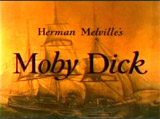
|
Moby Dick (1956)
In director John Huston's and Warner Bros.' dramatic,
tragic, but stirring chase-adventure film about a white whale -
it was based on Herman Melville's 1851 novel Moby Dick,
about the obsessive, self-destructive hunt by a possessed
and mad sea-captain for a legendary, monstrous great white whale;
the screenplay was scripted by both Ray Bradbury and Huston himself,
the film's complex themes were numerous: good vs. evil, and man vs.
God, amongst others:
- the opening sequence was closely aligned with Herman
Melville's original tale - it told about the arrival of young sailor
Ishmael (Richard Basehart) in the whaling town of New Bedford in
1841; it was accompanied with his voice-over, as he proceeded
on foot downhill to the Spouter Inn: ("Call
me Ishmael. Some years ago, having little or no money, I thought
I would sail about and see the oceans of the world. Whenever I
get grim and spleenful, whenever I feel like knocking people's
hats off in the street, whenever it's a damp, drizzly November
in my soul, I know that it's high time to get to sea again. Choose
any path you please and ten to one, it carries you down to water.
There's a magic in water that draws all men away from the land,
leads them over the hills, down creeks, and streams and rivers
to the sea. The sea - where each man, as in a mirror, finds himself.
And so it was I duly arrived at the town of New Bedford on a stormy
Saturday late in the year 1841")
- Ishmael's intention was to
sign on as a sailor on the whaling ship the Pequod; the
eager and adventuresome young lad spent the night in a boarding
house with a "strange bedfellow" -
tattooed Pacific Islander harpooner Queequeg (Friedrich von Ledebur);
both were hired the next day to join Captain Ahab (Gregory Peck)
in his demonic and maniacal quest for a white whale
- before leaving, Ishmael attended a church service
led by Puritanical Father Mapple (Orson Welles), who delivered
a long, stirring, cautionary sermon from a prow-shaped
pulpit about the Biblical character of Job and the consequences
of disobeying God's will; he ranted about
the battle of good vs. evil in the soul of man, with nautical metaphors,
reference to St. Paul, and inspiration from the Biblical whale
tale of Jonah, ending with the words: ("...Jonah did the Almighty's
bidding. And what was that, Shipmates? TO PREACH THE TRUTH IN THE
FACE OF FALSEHOOD. Now Shipmates, woe to him who seeks to pour
oil on the troubled waters when God has brewed them into a gale.
Yea, woe to him who, as the Pilot Paul has it, while preaching
to others is himself a castaway. But delight is to him who against
the proud gods and commodores of this Earth stands forth his own
inexorable self, who destroys all sin, though he pluck it out from
under the robes of senators and judges! And Eternal Delight shall
be his, who coming to lay him down can say:- O Father, mortal or
immortal, here I die. I have striven to be thine, more than to
be this world's or mine own, yet this is nothing, I leave eternity
to Thee. For what is man that he should live out the lifetime of
his God?")
- the Pequod made its sailing departure from
Nantucket for a whaling expedition
- one-legged Captain Ahab made a dramatic entrance
when he first appeared before his crew (with the narrator's voice-over
description) - "Looming straight up and over us, like a solid
iron figurehead suddenly thrust into our vision stood Captain Ahab.
His whole, high, broad form weighed down upon a barbaric white leg
carved from the jawbone of a whale. He did not feel the wind or smell
the salt air. He only stood staring at the horizon with the marks
of some inner crucifixion and woe deep in his face"
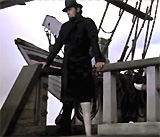
Captain Ahab's Entrance
|
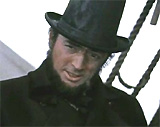
The Crazed Ahab's Description of His Prey
|
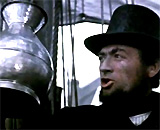
Toast Proposed by Ahab: "The Measure. Drink
and Pass"
|
- in the subsequent scene, Ahab described the
curious crew's prey, a great white whale; he offered a "Spanish
gold ounce" to the first one who sighted the whale: ("You're
to look for a white whale. A whale as white and as big as a mountain
of snow...Whosoever of ye finds me that white whale, ye shall have
this Spanish gold ounce, my boys! It's a white whale, I say. Skin
your eyes for him")
- and then throughout the sailing,
Ahab vengefully ranted and raved about the injustice of his own maiming
(he lost his left leg and had a replacement peg leg) on a previous
voyage years earlier against the monstrous beast. The crew toasted
their objective - to bring "Death to Moby Dick." ("He's
struck full of harpoons, men. And his spout is a big one, like a
whole shock of wheat. And he fantails like a broken jib in a storm.
Death, men, you've seen him. It's Moby Dick....Aye. It was Moby Dick
that tore my soul and body until they bled into each other. Aye.
I'll follow him around the Horn and around the Norway Maelstrom and
around Perdition's flames before I give him up. This is what you've
shipped for, men. To chase that white whale on both sides of land
and over all sides of earth until he spouts black blood and rolls
dead out. What say ye? I think you do look brave. Will ya splice
hands on it?...Steward, go draw the great measure of grog. Harpooneers,
get your weapons. Mates, your lances. Ye mariners, now ring me in
that I may revive a noble custom of my fisherman fathers. The measure.
Drink and pass. Round with it, round. Quick draughts, long swallows,
men. It's hot as Satan's hoof. That way it went, this way it comes.
It spiralizes in ye. Here, hand it me. Well done. Almost drained.
Advance, mates. Cross your lances. Now, let me touch the axis. Do
you feel it? That same lightning which struck me, I now strike to
this iron. Does it burn, men? Does it burn? Harpooneers, break your
weapons. Turn up the sockets. Drink here, harpooneers, drink and
swear. God hunt us all if we do not hunt Moby Dick to his death" -
Crew: "Death to Moby Dick!")
- Captain Ahab also eloquently delivered a monologue
to Quaker Chief Mate Starbuck (Leo Genn), about how he began hunting
whales forty years earlier as a "boy harpooner"; he described
his relentless, obsessive search every since to pursue the great
white whale Moby Dick: ("Why this madness of the chase,
this boiling blood and smoking brow? Why
palsy the arm at the oar, the iron, the lance? I feel old, Starbuck,
and bowed. As though I were Adam staggering under the piled centuries
since paradise....What is it? What nameless, inscrutable, unearthly
thing commands me against all human lovings and longings to keep
pushing and crowding and jamming myself on all the time, making me
do what in my own natural heart I dare not dream of doing? Is Ahab,
Ahab? Is it l, God, or Who that lifts this arm? But if the great
sun cannot move except by God's invisible power, how can my small
heart beat, my brain think thoughts, unless God does that beating,
does that thinking, does that living, and not l? By heavens, man,
we are turned round and round in this world. Like yonder windlass
and fate is the handspike. And all the time, that smiling sky and
this unsounded sea. Look ye into its deeps and see the everlasting
slaughter that goes on. Who put it into its creatures to chase and
fang one another? Where do murderers go, man? Who's to doom when
the judge himself is dragged before the bar?")
- during the journey, Starbuck suggested a mutiny against
Ahab's insane quest to change course from successful whaling, in
order to follow reports of Moby Dick's whereabouts. He spoke to his
fellow officers: cheerful, pipe-smoking 2nd mate Stubb (Harry Andrews)
and 3rd mate Flask (Seamus Kelly), but they resisted him
- Starbuck reacted by expressing the inevitability
of their pre-determined fate, if he couldn't end Ahab's life with
one gunshot; he trembled before Ahab, knowing he could not stop him:
("Because I do not have the bowels to slaughter thee and save the whole ship's
company from being dragged to doom. Oh, I plainly see my miserable
office: to obey, or rebelling. Worse still, to help thee to thine
impious end")
- a foreshadowing of the ship's
fate came with Queequeg's order to have the ship's carpenter construct
a water-proofed coffin for him. During their ominous and unholy search
for the whale, the Pequod came upon the Rachel,
another whaling ship from New Bedford. Captain
Gardiner (Francis de Wolff) requested that Ahab aid in a search for
his missing youngest son who had been carried away by the whale,
but Ahab coldly refused
- after a damaging typhoon, Ahab confirmed that he sensed
that they were close to the white whale: ("Starbuck,
ye are tied to me. This act is immutably decreed. It was rehearsed by
ye and me a billion years before this ocean rolled. The air. Do you smell
it, lads, what the wind carries?...Aye. A coral reef, green moss, shells,
bits and pieces from all the oceans he ever swam through. An island to
himself is the white whale"); shortly later, Moby
Dick was finally spotted and there came the cry: ("Thar she blows!")
- Ahab ordered his harpooners and crew to pursue the
beast in long boats, for an ill-fated chase. Ahab was finally able
to encounter his nemesis - the great white whale. The whale furiously
retaliated and counter-attacked in a thrilling sequence
- Ahab's harpoon struck the side of the whale, but also
ensnared him in the weapon's rope; lashed up against Moby Dick, he
became entangled in the harpoon ropes wrapping around the mortally-wounded
creature, but still frantically stabbed at the whale's side until
it submerged and drowned him: ("From hell's
heart, I stab at thee! For hate's sake, I spit my last breath at thee,
thou damned whale!")
- the sailors watched as the whale
surfaced, and saw that the dead Ahab's loose arm was signaling to
them: "You see? Do you see? Ahab beckons. He's dead, but he beckons"; they saw
the monstrous wounded whale continue its rampage against the ship
- it returned to the Pequod to sink it by circling around
it and creating a deadly, maelstrom whirlpool, killing all crew
members except the sole-surviving Ishmael
- a final voice-over was presented
by Ishmael, who was rescued by clinging and resting on Queequeg's
coffin; he was later picked up and saved by the Rachel -
he was the only one left to tell the tale of what had happened: ("Drowned
Queequeg's coffin was my life buoy. For one whole day and night,
it sustained me on that soft and dirge-like main. Then a sail appeared.
It was the Rachel. The Rachel, who in her long melancholy
search for her missing children found another orphan. The drama's
done. All are departed away. The great shroud of the sea rolls over
the Pequod, her crew and Moby Dick. I only am escaped, alone
to tell thee")
|
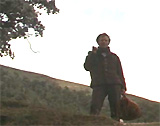
Ishmael's Opening Voice-Over Sequence

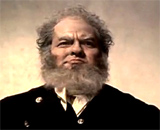
Father Mapple's Sermon
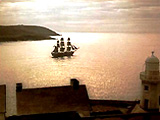
The Sailing of the Pequod
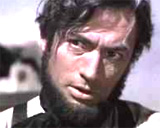
Captain Ahab's Monologue to Starbuck (Leo Genn) About
His Crazed Quest

Ahab's Obsessive Quest
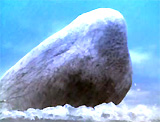
Encounter with the Great White Whale
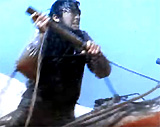
Ahab - Stabbing at Whale with Harpoon
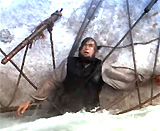

Ahab Entangled in Ropes Around Moby Dick - Beckoning the
Sailors to Continue the Quest After His Death
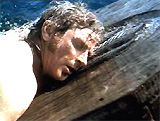
Ishmael's Salvation on Queequeg's Floating Coffin
|












